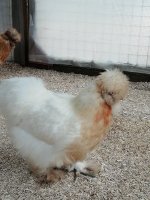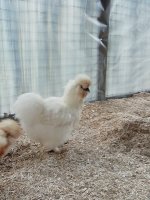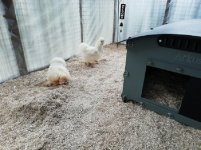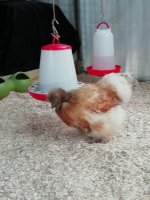I've decided that if and when any of mine become ill, I'll do my best to treat them at home with the help of friends on here and a bit of experience, as you are doing so successfully. Chickens often seem to respond to simple home remedies and general good management, without recourse to the vet and definitely no antibiotics. Vets seem to prescribe Tylan or Baytril whenever they're not sure what's wrong with the bird, maybe because the client expects them to do something, and despite the drawbacks of antibiotic drugs, and if they do get better it's put down to the antibiotic whether or not that had anything to do with it. Also, although I'm fond of my chickens I'm resistant to paying vets bills, which are very high in proportion to the cost and life expectancy of a chicken, although I understand that other people will do almost anything for their birds. With a bit of hard-won experience, you get to the stage where you can recognise conditions which are most probably terminal and painful, such as prolapse, peritonitis or various contagious or infectious diseases such as bronchitis or Mareks, and in these cases I'd have no hesitation in culling the bird. Fortunately, with good management and healthy stock to start with, such occurrences are rare, and my main problem is the tendency for hens to clutter up the run by living very long and healthy lives long after their egglaying days are over!
You are using an out of date browser. It may not display this or other websites correctly.
You should upgrade or use an alternative browser.
You should upgrade or use an alternative browser.
Poorly chuck
- Thread starter hip chick
- Start date
Chrismahon im going to order the Avipro Avian today. Do you put it in their water everyday !!
Marigold im sure I will learn more and more as time goes on, and think I will be avoiding the vet at all costs in the future. Its good to know ive got people on hand who have the knowledge and experience
Marigold im sure I will learn more and more as time goes on, and think I will be avoiding the vet at all costs in the future. Its good to know ive got people on hand who have the knowledge and experience
Thought I,d upload a few pics while im getting the hang of it. Couldnt get any of Ethel as she was in the nestbox, but pics of my other girls, and the lovely Hetty who's hopefully on the mend
View attachment 4
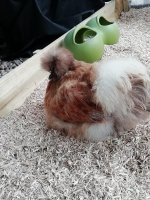
View attachment 1
View attachment 2
View attachment 3
View attachment 4

View attachment 1
View attachment 2
View attachment 3
Tweetypie
Member
Such beautiful hens, Hip Chick, like fluffy meringues  I'm pleased Penny appears to be on the mend.
I'm pleased Penny appears to be on the mend.
Beautiful! They look like those old-fashioned powder puffs my grandmother used, especially the seductive shot of Hettie's nice clean bum.
rick
Active member
They are lovely hip chick!
Its always good to be observant Tweetypie and sneezing is always to be noted - I'd damp down the dust bath just a little if its very dry. Some saline solution on kitchen roll is good to clean up and clear nostrils.
Tweetypie said:Do you think I am being over cautious?
Its always good to be observant Tweetypie and sneezing is always to be noted - I'd damp down the dust bath just a little if its very dry. Some saline solution on kitchen roll is good to clean up and clear nostrils.
Tweetypie
Member
rick said:They are lovely hip chick!
Tweetypie said:Do you think I am being over cautious?
Its always good to be observant Tweetypie and sneezing is always to be noted - I'd damp down the dust bath just a little if its very dry. Some saline solution on kitchen roll is good to clean up and clear nostrils.
Hi Rick, thanks for replying. I did clean her nostril with some clean, damp, tissue a couple of times. She wasn't sneezing as much earlier this evening, but I will definitely keep an eye on her. She uses the space under the shrubs to bathe in, but has also ventured into my rockery borders this week, so wonder if there was something in there. Do you think ant powder could cause it, as this was used near that rockery 5 days ago.
interesting article here, explaining how birds breathe. its a sort of mixture of air coming into the lungs and being stored in the bones, which makes the bird lighter in flight. Certainly, any type of toxic powder would be best avoided, for your sake as well as the chickens, and this includes dry diatomaceous earth in the coop, as this is very harmful to lungs.
https://www.petcoach.co/article/respiratory-system-of-birds-anatomy-and-function/
Are the ants a problem? I would have thought the hens might eat them, if untreated?
https://www.petcoach.co/article/respiratory-system-of-birds-anatomy-and-function/
Are the ants a problem? I would have thought the hens might eat them, if untreated?
chrismahon
Well-known member
Chickens get hay fever surprisingly- results in a lot of sneezing. We've had several this year with pollen from the trees and treated them with a single 1mL shot of cod liver oil. This gives the immune system a boost and definitely works for us.
A runny nose can be a residue of mycoplasma. I read half chickens carry it but few are affected- we have one that occasionally throws up symptoms but, as she is very healthy (apart from a dislocated hip), it never develops into anything other than a blocked nose on one side. We know that she has it because her sister died with chronic symptoms shortly after arriving at their new home- the stress of the move depressed her immune system and the illness overwhelmed her.
Chickens are very susceptible to dust which irritates their airways causing sneezing and a runny nose. We had two Orpingtons that arrived with dust around their noses and their symptoms didn't subside for a month. Occasionally they flared up again which we soon traced to dusty feed.
Avipro Avian has two doses. A scoop to 100mL is the emergency dose we we administer with a syringe to an individual at at least 10mL per day for several days. Takes about a week or so for the effects to be noticed. There is a maintenance dose of 200mL to a scoop which we have never applied so I don't know the frequency.
A runny nose can be a residue of mycoplasma. I read half chickens carry it but few are affected- we have one that occasionally throws up symptoms but, as she is very healthy (apart from a dislocated hip), it never develops into anything other than a blocked nose on one side. We know that she has it because her sister died with chronic symptoms shortly after arriving at their new home- the stress of the move depressed her immune system and the illness overwhelmed her.
Chickens are very susceptible to dust which irritates their airways causing sneezing and a runny nose. We had two Orpingtons that arrived with dust around their noses and their symptoms didn't subside for a month. Occasionally they flared up again which we soon traced to dusty feed.
Avipro Avian has two doses. A scoop to 100mL is the emergency dose we we administer with a syringe to an individual at at least 10mL per day for several days. Takes about a week or so for the effects to be noticed. There is a maintenance dose of 200mL to a scoop which we have never applied so I don't know the frequency.
Tweetypie
Member
Thanks, Chris. I think I will syringe 1ml of cod liver oil into a tiny cherry tomato, as she adores them and swallows them whole  She's OK so far this morning, no sneezing, so maybe something did irritate her, or hayfever, as you suggested. She does forage a lot more than the other 3 and is more adventurous. I bet she's been sticking her beak into stuff she shouldn't.
She's OK so far this morning, no sneezing, so maybe something did irritate her, or hayfever, as you suggested. She does forage a lot more than the other 3 and is more adventurous. I bet she's been sticking her beak into stuff she shouldn't.  10
10
rick
Active member
Chris has said it re Avipro pro biotic - but just to mention,
the 200mL water to a scoop is meant as an occasional top up/boost but for a 2L drinker that would be a large portion of a whole pot and it isn't cheap! The recommended dose in food is 10 times smaller - I guess its on the food and that is more effective, also better related in quantity to the food eaten.
My favorite pro biotic boost (well for the hens) is to put three heaped desert spoons of scratch grain into a jar, add 3 times the depth of spring water, add about a level teaspoon of Avipro and leave to ferment for a couple of days. Then mix that into a mash with pellets. The pot lasts ages and they love it!
... it should smell like malty sourdough, slightly vinegary, just a little yeasty. If it smells of acetone, alcohol or any other bad whiff then discard it but I have never had it go wrong. The Avipro adds to the good lacto-bactiria/yeasts already on the grain and so it gets off to a good start.
Or you could just mix the maintenance dose with food as it says on the container, of course!
the 200mL water to a scoop is meant as an occasional top up/boost but for a 2L drinker that would be a large portion of a whole pot and it isn't cheap! The recommended dose in food is 10 times smaller - I guess its on the food and that is more effective, also better related in quantity to the food eaten.
My favorite pro biotic boost (well for the hens) is to put three heaped desert spoons of scratch grain into a jar, add 3 times the depth of spring water, add about a level teaspoon of Avipro and leave to ferment for a couple of days. Then mix that into a mash with pellets. The pot lasts ages and they love it!
... it should smell like malty sourdough, slightly vinegary, just a little yeasty. If it smells of acetone, alcohol or any other bad whiff then discard it but I have never had it go wrong. The Avipro adds to the good lacto-bactiria/yeasts already on the grain and so it gets off to a good start.
Or you could just mix the maintenance dose with food as it says on the container, of course!
Go easy on the cod liver oil - overdoses of Vit D are toxic to hens (as well as to people) and will make the eggs taste fishy. Try a single dose if you want to, but then maybe leave it on the shelf until the depths of winter, when they may benefit from a few drops sprinkled on their feed as a supplement.
I agree with Rick about adding Avipro (or any supplement) to feed rather than to water, as in water half of it will be thrown away when you change the drinker.
Or just don't bother with any supplements if your hens are apparently healthy and not moulting. Hens fed a sensible diet, like yours, are most unlikely to have any dietary deficiencies. The possible exception is Nettex Mineral Powder, which may help older hens who are beginning to experience poor shell quality. This has probiotics as well as minerals, and is also helpful when they're moulting. .
I agree with Rick about adding Avipro (or any supplement) to feed rather than to water, as in water half of it will be thrown away when you change the drinker.
Or just don't bother with any supplements if your hens are apparently healthy and not moulting. Hens fed a sensible diet, like yours, are most unlikely to have any dietary deficiencies. The possible exception is Nettex Mineral Powder, which may help older hens who are beginning to experience poor shell quality. This has probiotics as well as minerals, and is also helpful when they're moulting. .
Tweetypie
Member
They all seem healthy and agile, but i tjink i will get some avipro just in case I need it another time. They have acv in their water and smallholder crumble as mentioned by a few on here. I also put a sprinkle of that spice stuff in their feed now and again. Two cherry tomatoes each per day as a treat and the occasional slice of watermelon to share, which they scoff like they've never been fed for a week ?.
Tweetypie, im currently looking for new plants for around the outside of the pen, and came across this. Just thinking of you giving them tomatoes daily
Plants that are part of the nightshade family - Members of the nightshade family include potatoes, tomatoes, and eggplant. The Latin name for these plants is Solanaceae. This is because they contain a compound called solanine. This is toxic to chickens. The compound can be broken down if the plants are cooked however. So any cooked potatoes or tomatoes are generally ok to give to your chickens. If you are worried, it is better to just not feed these plants to your chickens.
Plants that are part of the nightshade family - Members of the nightshade family include potatoes, tomatoes, and eggplant. The Latin name for these plants is Solanaceae. This is because they contain a compound called solanine. This is toxic to chickens. The compound can be broken down if the plants are cooked however. So any cooked potatoes or tomatoes are generally ok to give to your chickens. If you are worried, it is better to just not feed these plants to your chickens.
Tweetypie
Member
Oooh gosh I didn't know that about tomatoes. I knew raw potato was. I just googled it and the stems and leaves are indeed poisonous, but not the actual tomato. Can anyone else confirm, as u don't want to take the risk?
I've always given mine any left-over ripe tomatoes with no problems. The red colour really excites them, chickens are particularly sensitive to red, - which is why drinkers for chicks are usually red as it encourages them to drink. I wouldn't give them unripe ones, though.


